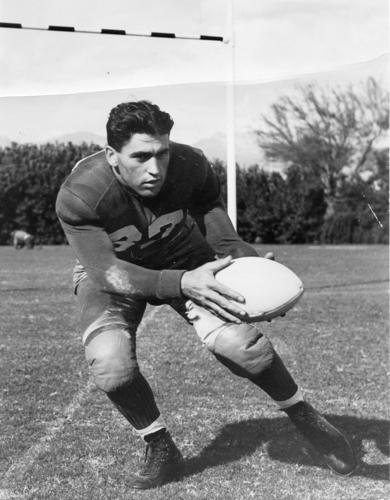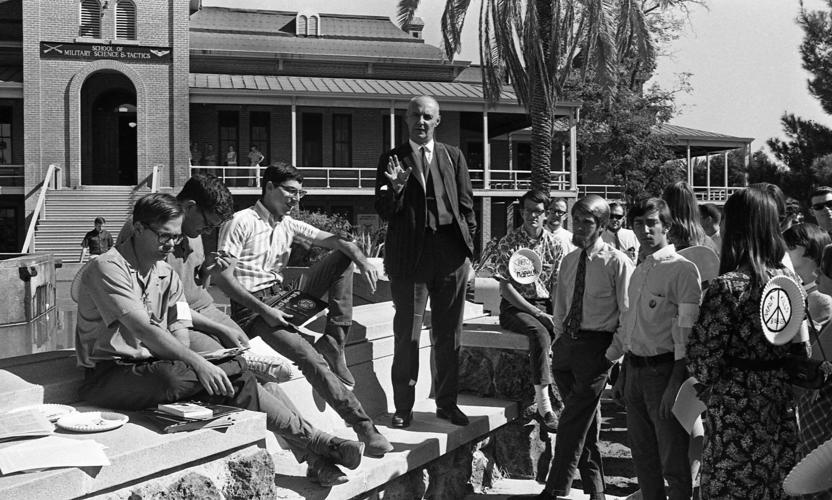In the summer of 1937, Jerome High School football coach Waldo Dicus wrote a letter to UA athletic director Pop McKale and recommended he award a football scholarship to the Muckers’ star halfback, Bob Svob.
Muckers is a mining term. Jerome was a mining town. Without a football scholarship, Bob Svob would not be able to afford college; he might’ve been a mucker for life.
Fortunately, Dicus’ word was gold on the UA campus; he had been captain of both the Wildcat football and basketball teams a decade earlier. Without seeing Svob play, McKale agreed. Svob suited up for his first UA football practice on September 17, 1937.
There were 61 freshmen at Varsity Stadium that day; attrition would be steep. Only 12 of the 61 freshmen would ultimately make the UA football team before being engulfed by World War II.
One of the reasons Svob hoped to play football for the Wildcats was because he didn’t want to be a mucker. His father, Ignac Svob, born in Fuzina in what is now Crotia, was dying of silicosis of the lung, the tragic result of working in the dusty copper mine under the town of Jerome.
Before Bob’s first UA semester ended, his father died. He was only 56.
College football at Arizona in 1937 was so unlike college football in 2017 that many of Bob Svob’s teammates came not from California and Texas and Florida, but from small-town Arizona mining precincts like Clifton, Bisbee, Miami and Globe.
Football was a way to avoid dying of silicosis. For Bob Svob, it became the avenue for one of the most remarkable careers in UA history, sports or otherwise.
By 1941, the son of Croatian immigrants, the youngest of nine children, was coaching the same freshman team he played for in 1937. By 1945, he received a standing ovation at Bear Down Gym, introduced at halftime of a game against ASU.
The reason for the ovation? Svob was on leave from the Navy, from the Japanese island of Saipan, where he ferried troops to and from horrific battles that claimed tens of thousands of lives.
By 1950, Svob became the Southern Arizona commissioner of the Arizona Interscholastics Association, responsible for officiating, refereeing and scheduling high school sports. Simultaneously, he was the director of all UA intramurals, a full-time member of the faculty and father of four children.
By 1959, Svob became the first full-time assistant athletic director in UA history. In 1965, appointed the school’s dean of students, he was replaced by Cedric Dempsey, who would go on to be the executive director of the NCAA.
“I feel like someone who has come in to bat for Mickey Mantle,” Dempsey said in December 1965. “It’s a big job filling Bob Svob’s shoes.”
A few years later Svob was named the UA’s Dean of Students.
Bob Svob died last week. He was 98. He was a pillar of the community for decades, a man selected not just to the UA Sports Hall of Fame but also to the Pima County Sports Hall of Fame.
Long before the NCAA became the governing body of college sports, Svob, who was a stickler for doing the right thing, told me he broke one of the cardinal rules of UA sports. His wife, Shirley Deacon, his high school sweetheart, had been a Sun Devil.
He laughed and laughed and laughed.
Bob and Shirley were married in September, 1939, a few weeks before Bob became a key running back for the Arizona football team. But because Shirley was attending ASU, he kept their marriage a secret. In those days, that was a violation of team rules. The UA actually suspended Bob Svob for not disclosing he and Shirley were married.
He spent spring semester, 1940, working a full-time job and regaining his eligibility. Yet McKale thought so much of the former Jerome High Mucker that when Bob and Shirley bought their first house, McKale loaned them the money for a down payment.
In his 98 years, Bob Svob was a halfback, a coach, a dishwasher at the UA student cafeteria, a Navy Ensign, a referee, a teacher, a father, a leader and a community treasure. Typical of his humble nature, he once agreed to be a speaker at an annual fund-raiser for the Tucson YMCA.
When he arrived at the YMCA event, Svob discovered that he wasn’t the featured speaker at all. That would be Cleveland Indians pitcher Bob Feller, bound for baseball’s Hall of Fame.
“They didn’t even know I was there,” Svob told me with a smile. “I was almost invisible.”
But we know better. Few in Tucson sports history had more presence than Bob Svob.





